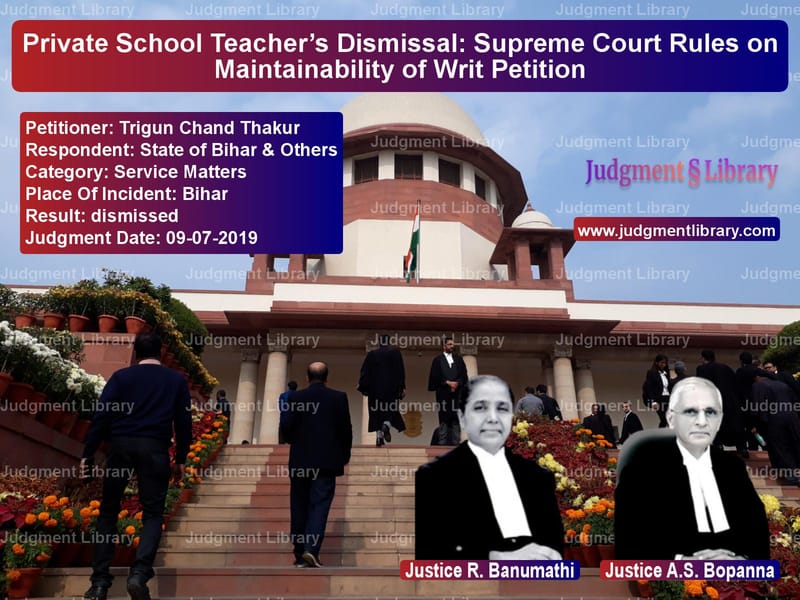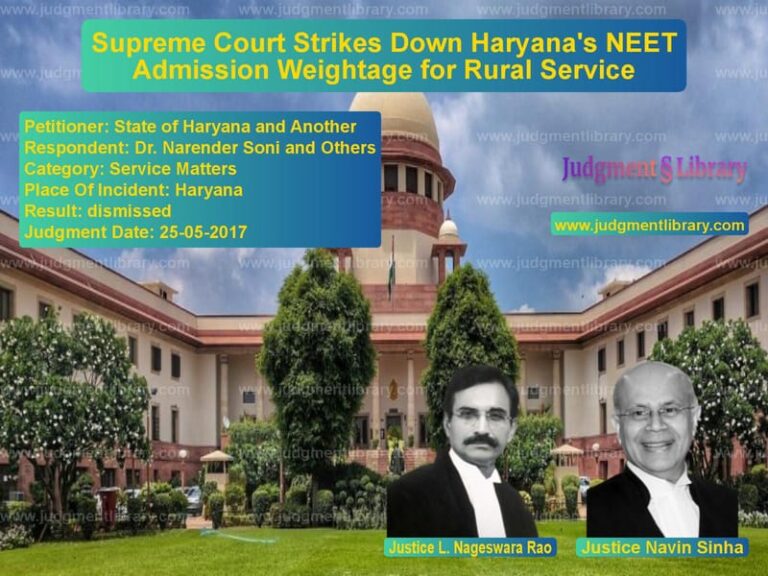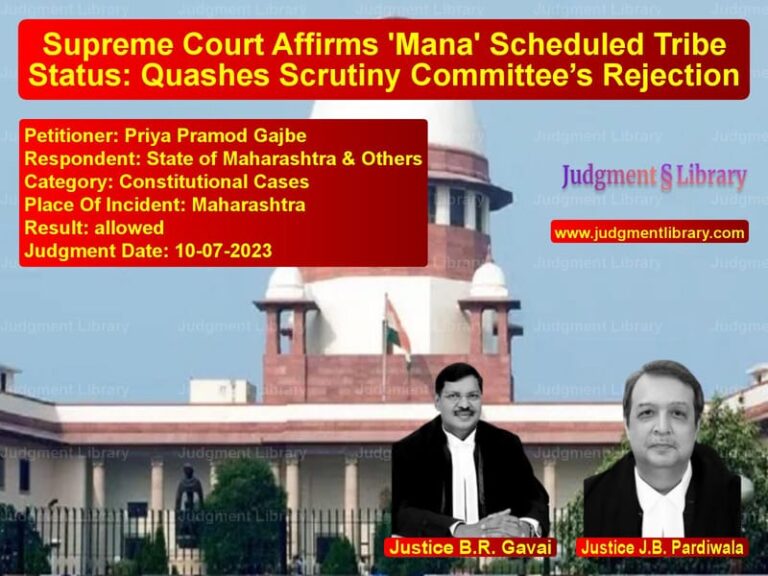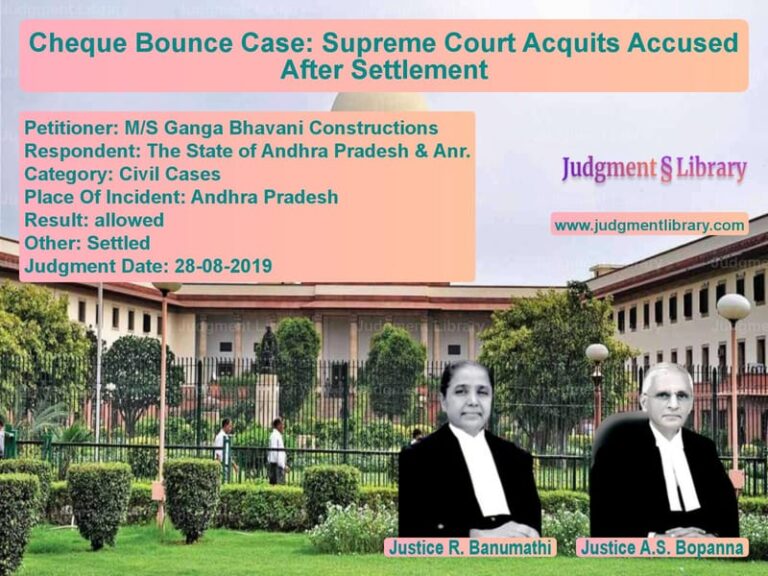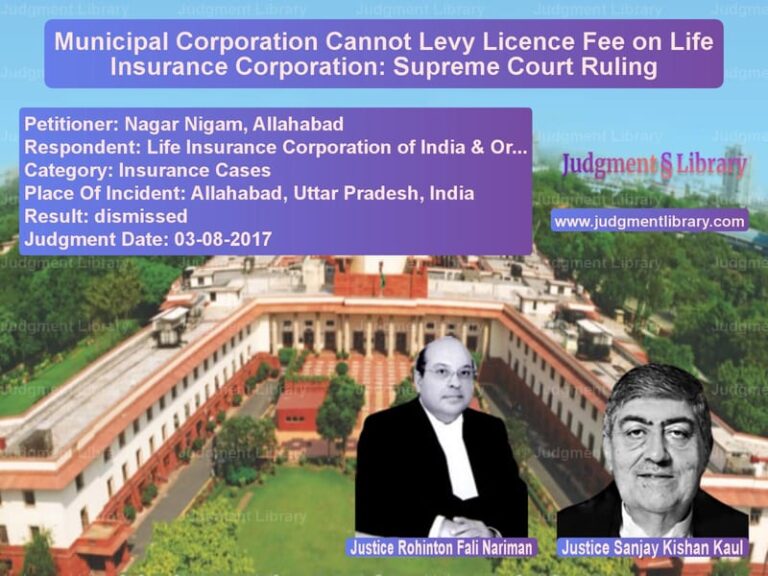Private School Teacher’s Dismissal: Supreme Court Rules on Maintainability of Writ Petition
The case of Trigun Chand Thakur v. State of Bihar & Others addresses the legal question of whether a teacher from a privately managed but state-aided school can challenge their termination through a writ petition under Article 226 of the Constitution of India. The Supreme Court upheld the Patna High Court’s decision, ruling that a private school’s management committee does not fall under the definition of ‘State’ under Article 12, making the writ petition untenable.
Background of the Case
The appellant, Trigun Chand Thakur, was appointed as a Sanskrit teacher at a privately managed school on January 1, 1985. On September 6, 1994, the school department issued a show-cause notice against him, alleging misconduct. Subsequently, on October 1, 1994, the appellant was suspended for being absent on Independence Day (August 15) and Teachers’ Day (September 5). His service was later terminated on December 23, 1994.
Chronology of Events
- The appellant challenged his termination by filing a writ petition before the Patna High Court.
- The Single Judge disposed of the writ petition on August 31, 1995, directing the appellant to present his case before the Chairman, Bihar Sanskrit Shiksha Board.
- The Chairman reviewed the case on August 3, 1996, and found the termination disproportionate, ordering the appellant’s reinstatement.
- The school’s Managing Committee challenged this order before the Special Director of Secondary, Primary, and Adult Education, who remanded the matter back to the Chairman on December 13, 1997.
- The appellant filed another writ petition against the remand order, arguing that the school had no jurisdiction to contest the Board’s decision.
- The Single Judge dismissed the writ petition, ruling that a privately managed school’s decisions cannot be challenged under Article 226.
- The appellant filed a Letters Patent Appeal (LPA) No. 670 of 1999, which was dismissed by the Division Bench on January 21, 2008, affirming that a private school’s management committee is not ‘State’ under Article 12.
- The appellant then approached the Supreme Court.
Arguments of the Parties
Petitioner’s (Trigun Chand Thakur’s) Argument
- The appellant argued that the Bihar Sanskrit Shiksha Board was a statutory body and had overriding authority over the school’s management.
- Since the school received state financial aid, it was performing public functions and should be considered ‘State’ under Article 12.
- The Chairman of the Bihar Sanskrit Shiksha Board had already ruled in his favor, and the Special Director had no jurisdiction to remand the matter.
- The termination order violated principles of natural justice.
Respondent’s (State of Bihar & Others) Argument
- The school’s managing committee was a private entity, and its actions could not be challenged through a writ petition.
- Financial aid from the state does not automatically make an institution a ‘State’ under Article 12.
- The appellant had alternative remedies available under service laws but chose to file a writ petition.
- The Patna High Court had previously ruled in Chandra Nath Thakur v. Bihar Sanskrit Shiksha Board that private school teachers cannot invoke Article 226.
Supreme Court’s Analysis
Applicability of Article 12
The Supreme Court examined whether the private school’s managing committee could be classified as ‘State’ under Article 12 of the Constitution. It reaffirmed the High Court’s ruling that:
“The Management Committee of a private school, even though financially aided by the State Government or the Board, cannot be considered ‘State’ within the meaning of Article 12.”
Maintainability of the Writ Petition
The Court held that a writ petition under Article 226 is not maintainable against a private school. It cited precedent stating that merely receiving government aid does not make an institution subject to writ jurisdiction.
Scope of Judicial Review
The Court noted that courts should not interfere in private employment disputes unless the institution has statutory backing. It ruled:
“A teacher of a privately managed school, even though financially aided, cannot maintain a writ petition against an order of termination from service.”
Final Judgment
The Supreme Court dismissed the appeal, affirming that the appellant’s writ petition was not maintainable.
“We do not find any ground to take a different view.”
Significance of the Judgment
- Clarifies the Scope of Article 12: Private school management committees do not qualify as ‘State’ under Article 12.
- Limits Writ Jurisdiction: Private employees cannot seek relief under Article 226 unless their employer has statutory authority.
- Upholds Alternative Remedies: Disputes involving private institutions should be addressed through service laws rather than constitutional writs.
- Reinforces Judicial Precedent: The ruling aligns with previous decisions in similar cases, ensuring consistency in constitutional interpretation.
Conclusion
The Supreme Court’s judgment in Trigun Chand Thakur v. State of Bihar reinforces the principle that private institutions, even if financially aided by the government, do not fall under ‘State’ as defined in Article 12. The decision emphasizes the importance of seeking appropriate remedies through service laws rather than invoking writ jurisdiction. This ruling serves as a crucial precedent for employment disputes in private educational institutions.
Petitioner Name: Trigun Chand Thakur.Respondent Name: State of Bihar & Others.Judgment By: Justice R. Banumathi, Justice A.S. Bopanna.Place Of Incident: Bihar.Judgment Date: 09-07-2019.
Don’t miss out on the full details! Download the complete judgment in PDF format below and gain valuable insights instantly!
Download Judgment: Trigun Chand Thakur vs State of Bihar & Oth Supreme Court of India Judgment Dated 09-07-2019.pdf
Direct Downlaod Judgment: Direct downlaod this Judgment
See all petitions in Employment Disputes
See all petitions in Termination Cases
See all petitions in Judgment by R. Banumathi
See all petitions in Judgment by A. S. Bopanna
See all petitions in dismissed
See all petitions in supreme court of India judgments July 2019
See all petitions in 2019 judgments
See all posts in Service Matters Category
See all allowed petitions in Service Matters Category
See all Dismissed petitions in Service Matters Category
See all partially allowed petitions in Service Matters Category

